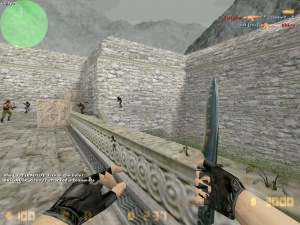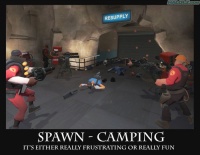Cheating in Videogames
Cheating is generally defined as defrauding, deceiving, and eluding. In the gaming environment, it consists of methods used by players to gain advantage or move forward in gameplay through guides, exploits, modifications and hacks that are not part of the gaming instructions (as defined by the game creator(s)). Cheating affects all the players involved, either intentionally or unintentionally, and has many different justifications and consequences.
Contents
Forms of cheating
Code
Mostly found in single player versions of games, a "cheat code" is a cheat placed in the game intentionally by the creator. Cheats can range from 'level skipping' to player modifications that simplify the difficulty of certain levels, or even the entire game. If implemented, most cheat codes are activated via a specific combination of buttons or keys. Some games have a specific password screen and others require the user to know where to input the password, such as the start screen or a drop-down console. For example, in the popular video game Grand Theft Auto, players can input codes to make a helicopter or tank appear, making it much easier to escape from the police, one of the main goals of the game. In Sim City 4, users can simply type in a "cheat" to have unlimited funds to build their city and make it thrive.
Some games have cheat codes that do not affect the game play, but rather alter the aesthetics of the game, thereby personalizing and individualizing the characters, landscape, or the gameplay itself. In NFL Blitz 2000, a game for the old gaming system N64, there is a 10 second window before the football game begins in which the user is encouraged to enter codes for the game. Of course some include altering plays or increasing the abilities of the players, but there are several that are simply aesthetic and for the fun of the game. For instance, some non-consequential codes include making the football comically large, making the player helmets comically large, changing the field from a grass field to a dirt field, or even making the stadium a roman coliseum. These codes are all created by the game makers to improve game customization and the general entertainment value for its players.
Cheat codes provide a way to increase the satisfaction that players get from a game as well as a way for creators to make additional profit. Before the advent of the internet, video game creators would publish books containing various cheat codes and hints, thus making additional money from the development of the game. Today, these books still exist, but many of these cheat codes are online as well.
Modifications/Hacks
Some cheats are carried out through illegal modifications of game code. These are called hacks. They work by hooking into a game's code and manipulating it in nefarious ways. Specifically, the program is run before launching a game's executable. Once the executable is launched, the hack finds the game's code in the computer memory. It then searches for specific variables, that pertain to game mechanics, such as opponent location data or wall colors. The objective is to give the user an unfair advantage within the game.
Some examples are:
Aim bots
An Aim Bot is a program which automatically detects enemies within a game and then moves the user's in-game crosshairs to a set location on the enemy's body. Specifically, a user can set it to target an enemy's head, body, legs, or arms. It can also be set to fire automatically, so that the user only needs to move around the map, and the hack will do the rest. Furthermore, more sophisticated implementations can be set to occasionally miss the target, or have generally reduced accuracy. This allows the user to obfuscate the use of hacks to outside observers.
Speed bots
Speed Bots allow the user to move through the map at speeds which are normally impossible. This means that the user could, for instance, nearly instantaneously move to the other side of a game map, whereas it might take a regular player over 20 seconds. All the other players would see is a blur, making it extremely difficult to kill the player, and thus giving a large advantage to the cheater.
Wall hacks
This is a more subtle cheat, which is more difficult to detect, both by in-game players and observers, as well as cheat-detection software. As the name implies, it allows a user to see through the walls by making them transparent. Thus, the cheater would be able to see enemies anywhere on the map, without actually having an in-game line of sight. These can be implemented in two ways:
- 1. Directly though a game hack that modifies game variables in memory. This makes detection more likely, however, since any cheat detection system can see the hack running.
- 2. Manually editing the wall textures to be transparent. Since many games allow user modifications to game skins (ie: how maps and in-game objects are displayed), a wall texture modified in such a way would basically be indistinguishable from any other "modded" wall textures.
Scripts
Players can also use scripts to assist with gameplay. An example can be found in older shooters like Wikipedia:Quake and Team Fortress Classic where the game engine increased the speed of the user if they strafed in the air. Users, with sufficient practice, could learn how to exploit this to greatly increase their speed (Bunny Hopping). Scripts eliminate the need to practice the required timing techniques, because they automate most of the commands. Players could bind a series of commands to a single key, and when pressed, their character would auto execute the entire series.
Example[1]::alias +hop "alias _special h_jump; h_start; slot10; alias hop_t -hop" :alias -hop "alias _special h_stop; alias hop_t +hop" :alias h_jump "+jump;wait;-jump;wait;h_start" :alias h_start "+attack2; -attack2" :alias h_stop "slot10" :alias hop_t "+hop" :bind "some_key" "hop_t"
Exploits
An exploit is a game bug that gives the player an advantage not intentionally programmed in by the game creator. For example, the effect of a grenade might not be fully canceled by a wall, allowing players to use a grenade to kill enemies through walls if they are close enough to the blast.
Guides
The use of guides is up to interpretation. The use of a strategy guide, or getting outside help, can be considered a form of cheating. Strategy guides generally tell the user exactly how to play a game, where to find items or powerups, and give step-by-step accounts on how to beat each level. They may also include other hints and tips to help the player along that the player wouldn't otherwise know about.
A popular website for game guides is GameFaqs, where most notable are the rather elegant text based guides and walkthroughs along with maps and other aids. It was created in November 1995 by Jeff "CJayC" Veasey and bought by CNET Networks in May 2003. It is currently owned by CBS Interactive. The site has a database of video game information, cheat codes, reviews, game saves, and screenshots, almost all of which is submitted by volunteer contributors. The systems covered include the 8-bit Atari platform through modern consoles, as well as computer games. Submissions made to the site are reviewed by the site's current editor, Allen "SBAllen" Tyner.
Other
Other forms of cheating include using external programs to interfere with the game which helps the user by allowing unlimited lives, adding items, activate in-game cheats, etc. Users can also modify game save files to cheat with methods such as making the game think that the user had 100 lives as opposed to 10 or possessing one or more door keys. In some games, such as Sonic the Hedgehog or Half Life, users are able to access developer debug tools which allow them to alter various aspects of the game environment, like weapon or item placement, and attributes of the player themselves, like invincibility or the removal of character clipping.
Reasons for cheating
All users have their reasons for cheating, such as frustration, difficulty, time, etc. In the case of playing online, especially in shooters, all players generally want to have the highest kill count and the lowest death count. When players cheat, they gain an unfair advantage over the other players that allows them to achieve the goal of being the best. It can also been seen as a lot more fun wreaking havoc on all your opponents, versus getting killed almost immediately every round.
According to Mia Consalvo, there are many possible reasons that may cause players to cheat, including:
- Players asserting agency
- Difficult scenarios: performing an instrumental action relative to gameplay
- Fun to play God: finding the complete gameplay experience
- Hitting fast forward
- Multi-player cheating
Some users may cheat because other users are cheating, and in interviews conducted by Consalvo, she found that players who cheat have few qualms about doing so. Others cheat just for the satisfaction they get from the frustration of other players[2].
Multiplayer cheating
See Also Online Cheating and Griefing
In the online environment players enter a competitive world where, generally, the aim of the game is to win. Some players may resort to cheating to make sure that they end up on top, some players just enjoy having an advantage over others, and some may cheat for the simple reason of "being an ass" (that being they get more enjoyment out of ruining the game for others but without any clear goal/aim). As said by Alfred in The Dark Knight: "...some men aren't looking for anything logical, like money. They can't be bought, bullied, reasoned or negotiated with. Some men just want to watch the world burn."
Introducing a ranking system gives gamers another reason to exploit the system to rapidly rise over their fellows. This leads to a power-gaming mentality of accomplishing everything one can by any means necessary or allowing a gamer to brag about their skill by pointing at their top ranking.
Camping also becomes an issue in online environments.
Notable cheats
For the Nintendo Entertainment System (NES)/Famicom, the game Contra made use of the Original Konami Code mandatory in order to get in a decent game.
In the late Nintendo Game Boy classic Pokemon Red/Blue, players could take advantage of a glitch in the system by battling the non-Pokemon "MissingNo" (Missing Number), and by doing so would grant nearly infinite supplies of whatever item is in the 6th slot in the player's item menu. This was typically used for Rare Candies (to put a player's Pokemon on steroids) and Master Balls (to catch all 150 + 1 if you knew how. Mew was unavailable for normal capture in the American versions of the first Pokemon Game Boy Games, which led to a popular obsession with trying to get it anyway. However, as in the "+1" link, it can be done).
In addition to cheating done by players alone, several companies sought to take advantage of an individual's desire to take advantage of exploits by creating products such as the GameShark, GameGenie, and Codebreaker. These machines allowed any gamer to cheat with incredibly ease on virtually any game. They work in the same fashion as a conventional game hack by hooking into the game's memory space and making modifications to certain variables.
There are also widely know cheats for games like the Sims, where the cheats are easily found through google.
Prevention
In the single player world, cheating only affects the single person playing, and prevention is not entirely necessary - or specifically up to the game creator to decided how and if they want to prevent cheating.
In the online world, prevention is more complicated and has many different methods:
See Online Cheating and Punishments in Virtual Environments
Ethical Implications
For some, cheating has come to be an intricate part of gaming culture. For those users who employ hacks and other types of "home-made" cheating, the fun of a video game comes not from the games itself but the havoc they are able to wreak on other players and the system itself.[2] This is ethically alarming due to the fact that this mentality could have very dangerous consequences if employed in real life. It can also be argued that it is not "cheating" if a user decides to use cheat codes because the creators were the one that put them there. This kind of mentality is especially problematic because it makes use of a moral framework that is not currently accepted in real life, that it is ok to cheat as long as you are taking advantage of a flaw in the system. When this thinking is applied to real life, the consequences are disastrous, as can be seen with users who abuse government programs and individuals that do not pay taxes.
See Also
References
- ↑ http://www.mpcforum.com/showpost.php?s=8534a1612c0de52073278a37b5cb22f8&p=98144&postcount=10 TFC Bunny Hop Script
- ↑ 2.0 2.1 Consalvo, Mia. Cheating: Gaining Advantage in Videogames (Chapter 4: Gaining Advantage: How Videogame Players Define and Negotiate Cheating). Cambridge, Massachusetts: The MIT Press, 2007.



